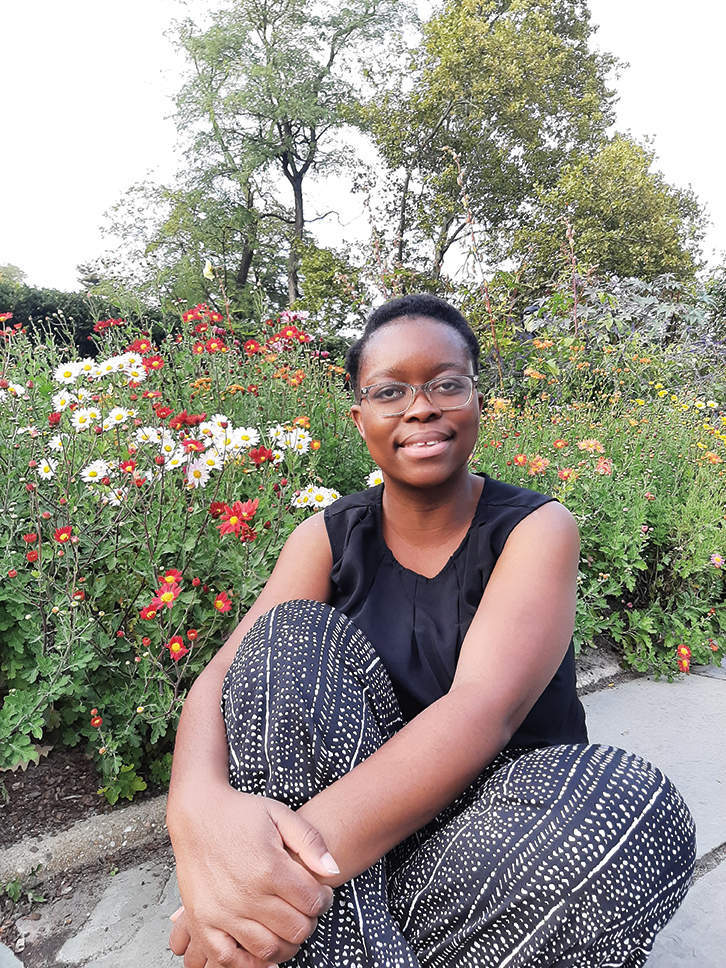Salima Etoka ’15
 DEGREES:
DEGREES:
B.A. in urban studies, political science, and French; M.P.P. from Harvard Kennedy School of Government
JOB TITLE:
Chief of staff, Center for NYC Neighborhoods
FAVORITE TRINITY MEMORY:
I was involved in the Chapel community on campus. I have very fond memories of Lessons and Carols. I knew it was a big showcase for Trinity and a fantastic way to start the holiday season. Chaplain Read really involved students, and I had many different roles. One year, I was a reader. Another I was carrying incense. One year I was lighting the candle, except I’m super short, so the photographer had to help me out.
What is the Center for NYC Neighborhoods?
The center is a nonprofit with the stated mission of promoting and protecting affordable homeownership in New York so that middle- and working-class families are able to build strong, thriving communities.
What was your path to your current position?
After I graduated, I participated in the Urban Fellows Program in New York City. The program recruits college graduates to work in mayor’s offices or city agencies. I did that for about a year and found the Center for NYC Neighborhoods and started there as a program associate. I went to graduate school and continued to work with the center part time as an analyst. Later, I was named deputy chief of staff, and now I am chief of staff.
What do you do in your role?
I work with the CEO/executive director and the executive team and serve as an executive team member. One of my main responsibilities is supporting the CEO, serving as the strategic adviser. I help schedule her meetings, prepare her for internal and external meetings, and lead our executive team meetings. I also work across the organization on key projects and initiatives. I get to do a little bit of everything. In essence, I’m a problem solver across the organization.
Would you share an example of a recent project?
I worked on the Homeowner Assistance Fund, the COVID relief program within New York state. One of my roles within that was to help facilitate the work among us as a nonprofit, the government stakeholder (the state), and other partners to launch that program.
What do you enjoy most about your work?
What I do day to day changes, so what I’m working on today is probably not what I’m going to be working on tomorrow. Work is always different and fast paced, so there’s always something happening. I like to learn, and I like to be involved in different things, so I think I have found a great career pathway.
What are the biggest challenges you face?
I’m working at different levels and with different people, so being able to manage the various dynamics can be a challenge. For me, it’s trying to understand where people are coming from while keeping in mind that I have to deploy projects and they have to get done for this organization of 100 people. I don’t think everybody is ever going to be happy with every decision, but how do you make sure that people feel like they are being heard? And once you get feedback, you have to think about how that gets incorporated into whatever you’re launching.
Was there a professor at Trinity who was particularly influential?
I took classes with Garth Myers. It was always great to take his classes because he focused on African cities. For someone who was born in Congo and then ended up here, I always have had an interest in African cities. While at Trinity, I went to Dakar, Senegal, and conducted my own research. Dean Chen was big for me because I thought that I wouldn’t go to China in my lifetime because it is so expensive and so far away. Taking classes with Dean Chen, I was able to learn about Chinese cities and work with him to find funding to do the China summer program. I also went to the Trinity program in Paris and took classes in French.
What would you say about your overall experience at Trinity?
For me, I came to Trinity College as a low-income Black student from Idaho who wanted different opportunities that maybe I didn’t have access to at home. Trinity offered me opportunities not just in the classroom but also outside the classroom. I mentioned my study-away experiences because, until Trinity, I hadn’t been able to leave the United States once my family came in because we didn’t have the money. As I think about what comes next, how can I offer other students like me the same opportunities to make the most of Trinity and then go out into the world?
